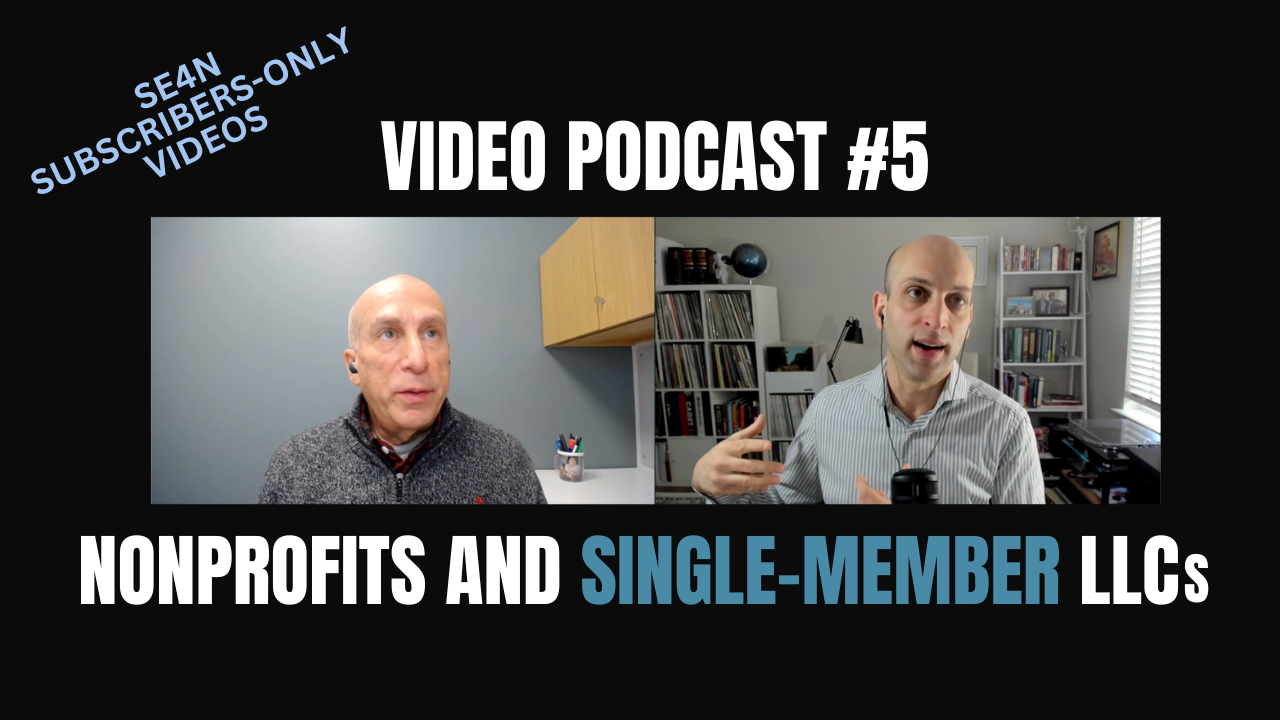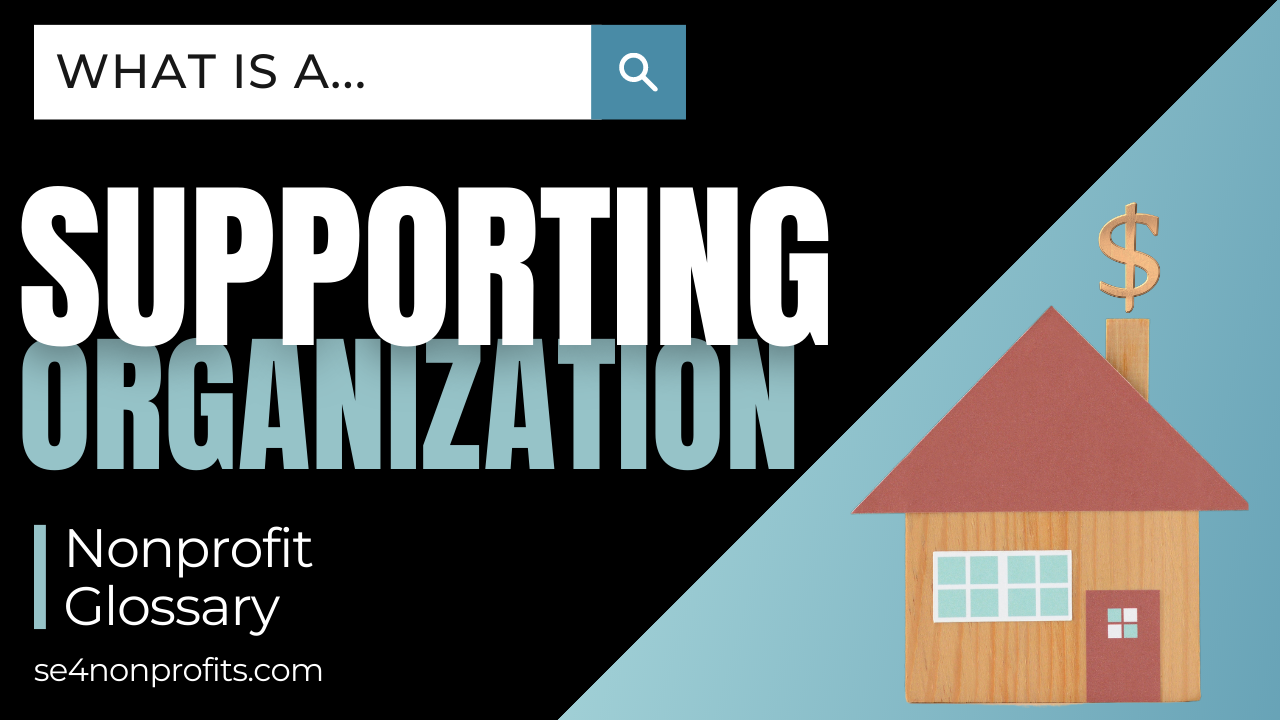
Blog.
Most Recent Posts

VIDEO Q&A for Subscribers: June 2025
Ben and Mike answer questions from subscribers about preparing to serve on a nonprofit Board of Directors, the pros and cons of group exemptions, mitigating auditor concerns about pledges receivable, and whether the rationale for a Board member's dissenting vote should be included in Board meeting minutes.
![VIDEO Q&A for Subscribers: November 2024 [PREVIEW]](https://images.squarespace-cdn.com/content/v1/5e6ccadfb4659c1d51df14d5/baccfbcd-ed95-49ed-b154-0bfec7efbc71/SE4N+Video+Q%26A+2024-11.png)
VIDEO Q&A for Subscribers: November 2024 [PREVIEW]
Ben and Mike answer questions from subscribers about the spending of operating reserves, conflicts of interest related founders of a nonprofit becoming staff, deciding between filing the Form 990-EZ and the Form 990, and legal issues raised by the moving of funds between related organizations.

VIDEO Q&A for Subscribers: October 2024
Ben and Mike answer questions from subscribers about managing staff concerns about the additional workload that may come from forming a new subsidiary or related entity, mid-year amendments to the annual budget, whether an organization should restore its good standing as a corporation prior to dissolving, and the distinction between restricted funds and Board-designated funds.

VIDEO PODCAST: Using a Single-Member LLC as a Nonprofit Subsidiary
Ben and Mike discuss tax, legal, and strategic considerations related to the use of single member limited liability companies (LLCs) by nonprofit organizations, including how and why nonprofits use this type of subsidiary structure, tips for drafting the Articles of Organization and Operating Agreement, and other issues such as charitable solicitation registrations and donor acknowledgment letters.

Why and How Nonprofits Use Limited Liability Companies (LLCs)
The Limited Liability Company (LLC) is a flexible and widely used entity structure in virtually every industry, from one-person businesses to some of the largest companies in the world. LLCs can also be useful as a subsidiary or joint venture vehicle for certain nonprofit programs or activities, but the use of single-member and multi-member LLCs in a nonprofit context is often misunderstood.

VIDEO: What is a Supporting Organization? | Nonprofit Glossary
SE4N's Benjamin Takis provides a short summary of what 501(c)(3) “supporting organization” status means, how it relates to a nonprofit organization's public charity status under Form 990, Schedule A, and some of the key requirements applicable to supporting organizations.

Q&A #146 – Is IRS approval required to become a supporting organization?
According to the IRS instructions for Schedule A of the Form 990, an organization that previously used the public support tests under sections 170(b)(1)(A)(vi) or 509(a)(2) of the Internal Revenue Code is not required to receive an IRS determination that it qualifies as a “supporting organization” under section 509(a)(3) before treating itself as supporting organization in Schedule A. However, some organizations may wish to request such an IRS determination using Form 8940.

Q&A #122 – Why would a nonprofit, tax-exempt organization form a single-member LLC?
When properly formed, a single-member LLC (SMLLC) that is wholly owned by a tax-exempt organization protects the parent organization from liability for the SMLLC’s activities while providing the SMLLC with the benefits of the parent organization’s tax-exempt status for federal tax purposes. The SMLLC structure is also generally easier to establish and more flexible than a subsidiary corporation.

The Wrong Way to Add a Charitable Arm to a For-Profit Business
I often receive inquiries from entrepreneurs who are looking to add a philanthropic component to an existing for-profit business, such as by forming a nonprofit as a charitable arm or subsidiary of their business or starting a corporate foundation. These ideas are usually well-intentioned. However, mixing business and charitable activities too closely can make IRS approval of 501(c)(3) status an uphill battle.
![A Lesson for Nonprofits about Public Perception from the Crisis Text Line Controversy [SUBSCRIBERS-ONLY]](https://images.squarespace-cdn.com/content/v1/5e6ccadfb4659c1d51df14d5/1709903325020-J1C3HBLFN06X624YSYZ4/adem-ay-ik_AuIWeBBM-unsplash.jpg)
A Lesson for Nonprofits about Public Perception from the Crisis Text Line Controversy [SUBSCRIBERS-ONLY]
A controversy involving the nonprofit organization Crisis Text Line’s sharing of anonymized data with a related for-profit entity has been a major topic of conversation recently following a lengthy report by Politico. While the specifics of this situation may be unique, this story is a lesson to all nonprofits that public perception should always be considered as one of the main factors in any decision, and this public perception can be just as important as legal formalities.

Q&A #95 – Can nonprofit parent and subsidiary organizations have identical Boards?
There is not a cut-and-dry answer to the question of whether nonprofit parent and subsidiary organizations with different tax-exempt statuses are permitted to have identical Boards. However, too much Board overlap could potentially increase the risks that one or both organizations will be perceived by the IRS to be violating the restrictions on their tax-exempt status. In the case of a parent 501(c)(6) chamber of commerce with a subsidiary 501(c)(3) organization, it is generally advisable to have at least one or two persons on the Board of the subsidiary who are not Board members of the parent.

Why and How Should a Nonprofit Form a Subsidiary?
The formation of subsidiaries is a consideration that surfaces during the lifetime of many nonprofit organizations as a strategy to expand operations, growth, and overall capacity to deliver more on mission. A subsidiary is a separate entity that is controlled (to some degree) by a parent organization, and subsidiaries are created by nonprofits for a wide variety of reasons.

Q&A #10 – Is now a good time to start a 501(c)(3) subsidiary?
This question surfaces a lot from 501(c)(6) entities and other non-501(c)(3) nonprofit organizations. The answer is almost always a strong yes. Even during this crisis, organizations should not hesitate to pursue this strategy as it will open doors to new opportunities and funding not previously available.